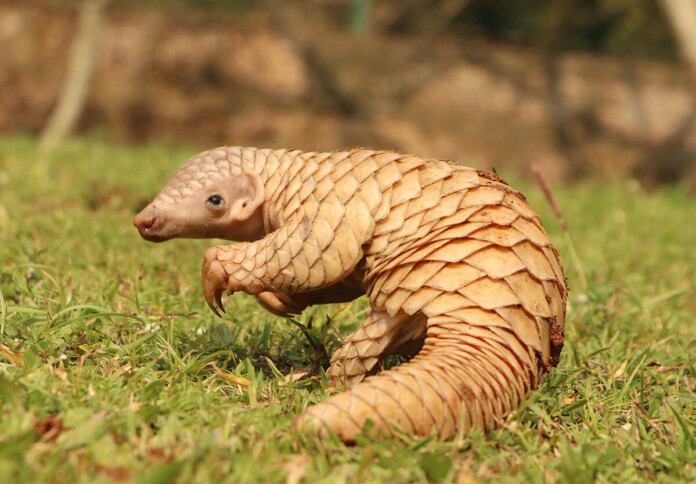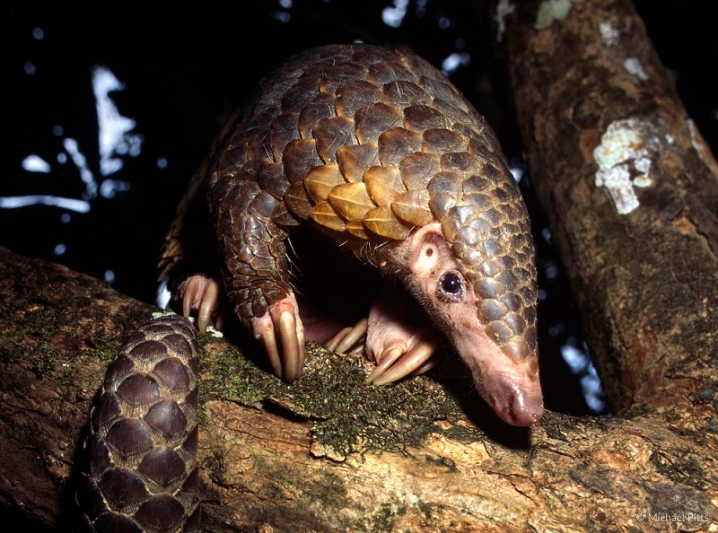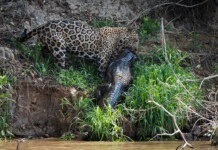Pangolins, globally, are being pushed to the brink of extinction due to rampant poaching for their meat and scales, which are falsely believed to have medicinal properties. Recently, news reports highlighted how Indonesian authorities thwarted an attempt to smuggle over a ton of endangered pangolin scales worth more than a million dollars. According to law enforcement officials, 1.2 tonnes of scales, valued at US$ 1.3 million, were discovered in North Sumatra’s Asahan district. The shipment was allegedly intended for China via Malaysia and Singapore.
Beyond illegal trafficking and poaching, these innocent creatures also face severe threats from habitat loss and climate change, making their protection an urgent necessity. In response, an Indian social enterprise is taking a meaningful step to safeguard pangolins in Indonesia. Grow-Trees.com, known for its large-scale afforestation initiatives in India, has launched the Trees for Sunda Pangolins project, aiming to plant 50,000 trees in Lela Village, West Kalimantan Province, Indonesia.
“This tree planting initiative originates from the deep concern over the critical challenges Sunda Pangolins face due to habitat destruction and relentless poaching. Though the International Union for Conservation of Nature classifies the species as critically endangered, it is the most trafficked mammal in the world, accounting for nearly 20 per cent of the illegal wildlife trade. By restoring degraded forest areas, many of which have been destroyed by human activities such as palm oil plantation expansion, our effort is to create a safe, thriving ecosystem where pangolins can find food, shelter, and breeding grounds,” says Pradip Shah, co-founder of Grow-Trees.com.
Since Sunda pangolins are adept climbers that rely on tree cover for shelter and access to ant nests, creating a well-forested environment is crucial for their survival. Accordingly, the trees selected for the project include species like Shorea balangaren and Dyera polyphylla, which provide dense canopy cover, preferred by pangolins for protection and shelter.
Meanwhile, Mr Shah also talked about some of the challenges that they faced while implementing the project in Indonesia. “A major challenge is deforestation caused by land clearing for palm oil and timber plantations. Indonesia also has a high vulnerability to forest fires. Peatlands, which store large amounts of carbon, are particularly susceptible to these fires. When damaged, they release significant carbon emissions, further accelerating climate change,” he adds.
Not just pangolins, but other mammals such as the long-tailed macaque, sun bear, black lutung, wild boar and lesser mouse deer will also benefit from the restored habitats, gaining better shelter and food sources. “As this is a new project, measuring the impact of our plantation efforts on local wildlife, particularly pangolins, will take time,” says Mr Shah.
He adds that the project actively involves local community members, from planting to nurturing the trees, creating employment opportunities and providing an additional source of income. Individuals and corporate entities can support the Trees for Sunda Pangolins initiative through https://www.grow-trees.com.
The Sunda Pangolin (Manis javanica) is a remarkable, yet critically endangered mammal known for its distinctive armour of scales. Native to the Malay Peninsula and Indonesia, this species has existed for over 80 million years, making it a living fossil. Its name derives from the Malay word ‘Penggulung’, meaning ‘roller’, which describes its behaviour of curling into a scaly ball to protect its soft underbelly.
Nocturnal and solitary, Sunda Pangolins are typically found in forested habitats where they spend much of their time climbing trees to find ant nests and resting in hollows or under the shade of epiphytic plants during the day. Often mistaken for a reptile due to presence of scales, pangolins are actually mammals. Despite the 2017 global ban on the commercial trade of all eight pangolin species, the battle against poaching and habitat destruction continues. The Sunda Pangolin faces severe threats. It is the most trafficked mammal in the world, making up nearly 20% of the illegal wildlife trade. The International Union for Conservation of Nature (IUCN) lists the species as critically endangered due to this relentless poaching and rapid habitat loss.
Project Timelines
The project commenced in 2018-19, with an initial target of planting 30,000 trees. Over subsequent years, additional plantations were undertaken, with 40,000 trees planted in 2020-21 and 28,670 trees in 2021-22. The initiative is ongoing, aiming to enhance the habitat of sloth bears in the Kumbhalgarh Sanctuary, Rajasthan.
Tree species
Sunda Pangolins are adept climbers that rely on tree cover for shelter and access to ant nests, making a well-forested environment vital for their survival. In our project, we are planting a diverse range of tree species to enhance the pangolin habitat. These include Shorea balangaren (Kawi), Pometia pinnata (Matoa), Dyera polyphyla (Jelutung rawa), Alstonia pneumatophore (Pulai), Pithecellobium jiringa (Jengkol), Rhodomyrtus tomentosa (Karamunting), etc.
Species like Shorea balangaren and Dyera polyphyla provide dense canopy cover, which is preferred by pangolins as it offers protection and shelter. Additionally, species such as Alstonia pneumatophore and Pithecellobium jiringa serve as host plants for ants and other insects, providing a crucial food source for pangolins. These trees will not only offer protection to the pangolins but also enrich and sustain their natural environment.











